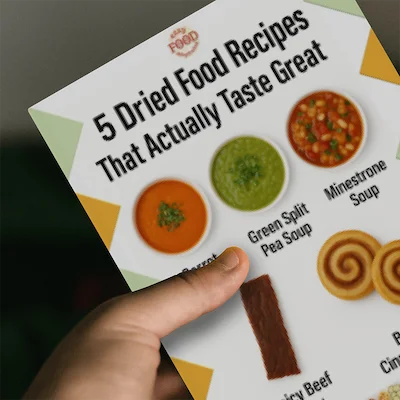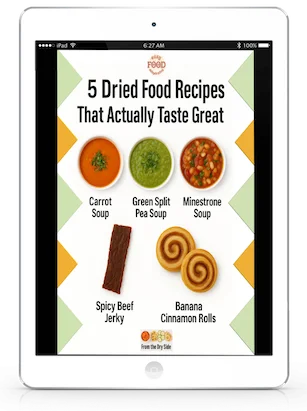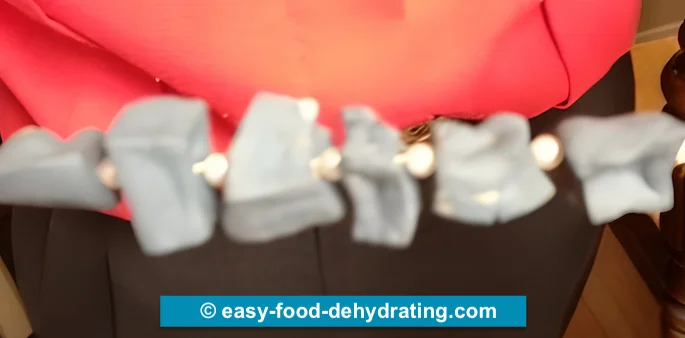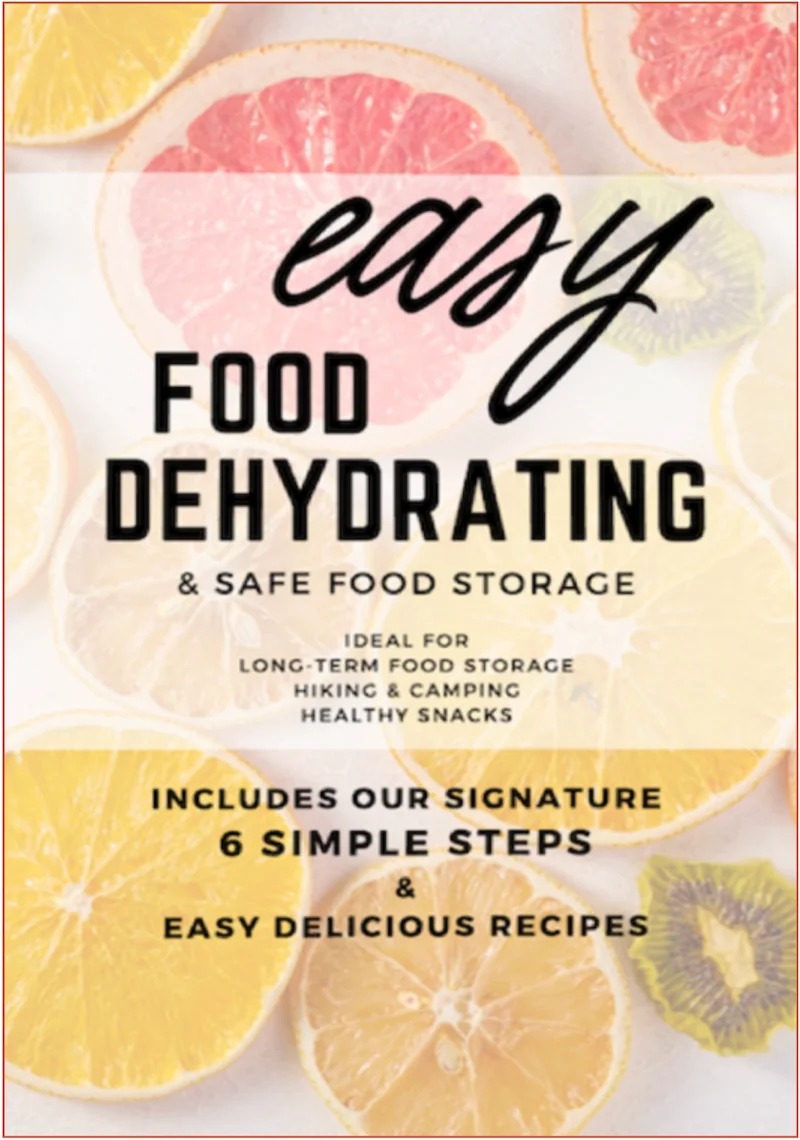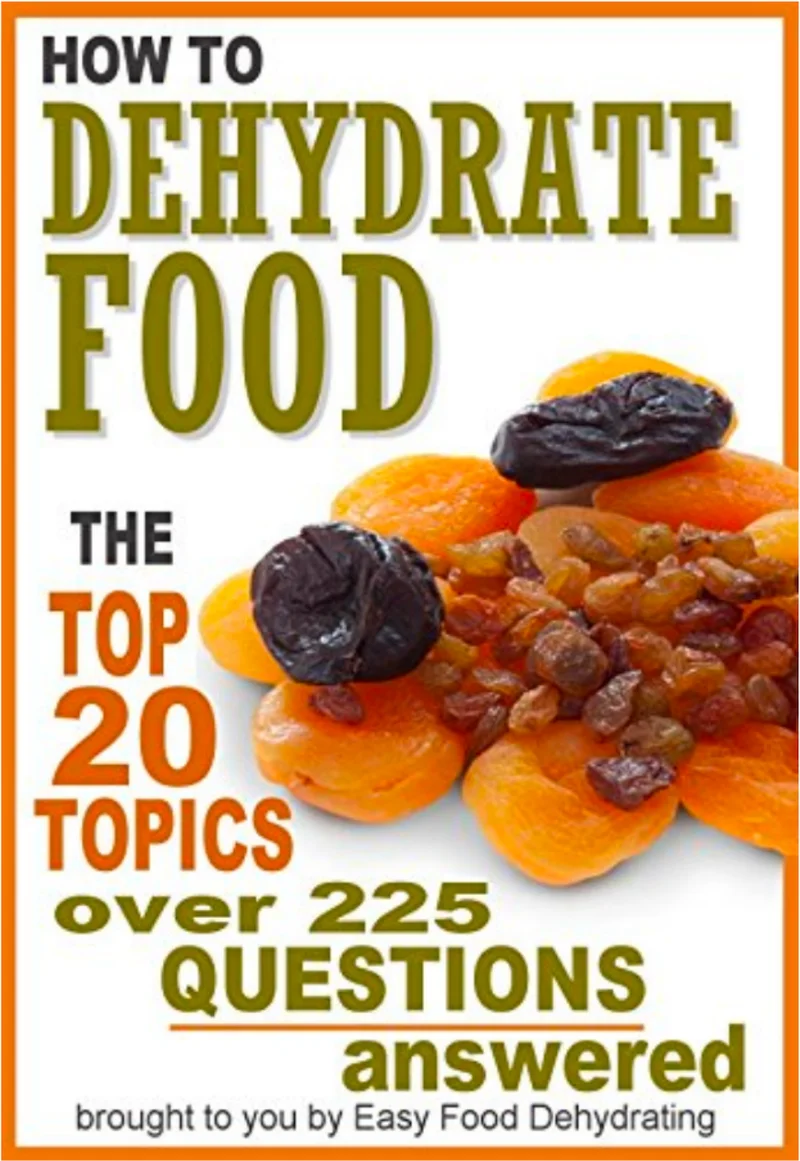What We Mean by “Dehydrate”
Here at Easy Food Dehydrating, “dehydrate” always means using an electric food dehydrator — the easy, reliable way to dry food at home.
- Home
- Dehydrating Vegetables: Step-by-Step Guides by Type
- How to Dehydrate Potatoes
How to Dehydrate Potatoes
for Stews, Soups, or Skillet Meals

Dehydrating potatoes is one of the easiest ways to extend their shelf life while keeping them ready for soups, stews, or quick skillet meals. Once dehydrated, potatoes store for months in airtight containers — saving you money and freezer space.It's time to learn how to dehydrate potatoes and they are one of the most versatile veggies out there!
✅ Quick Answer: How do you dehydrate potatoes?
Wash and parboil whole potatoes, refrigerate overnight, then slice about ⅜" thick. Arrange slices on dehydrator trays and dry at 125–135°F for 6–14 hours until leathery or brittle. Rotate trays for even results and store in airtight containers for long-term use.
With just a few simple prep steps, you can turn fresh or frozen spuds into lightweight, versatile ingredients that are perfect for emergency storage, camping trips, or everyday cooking.
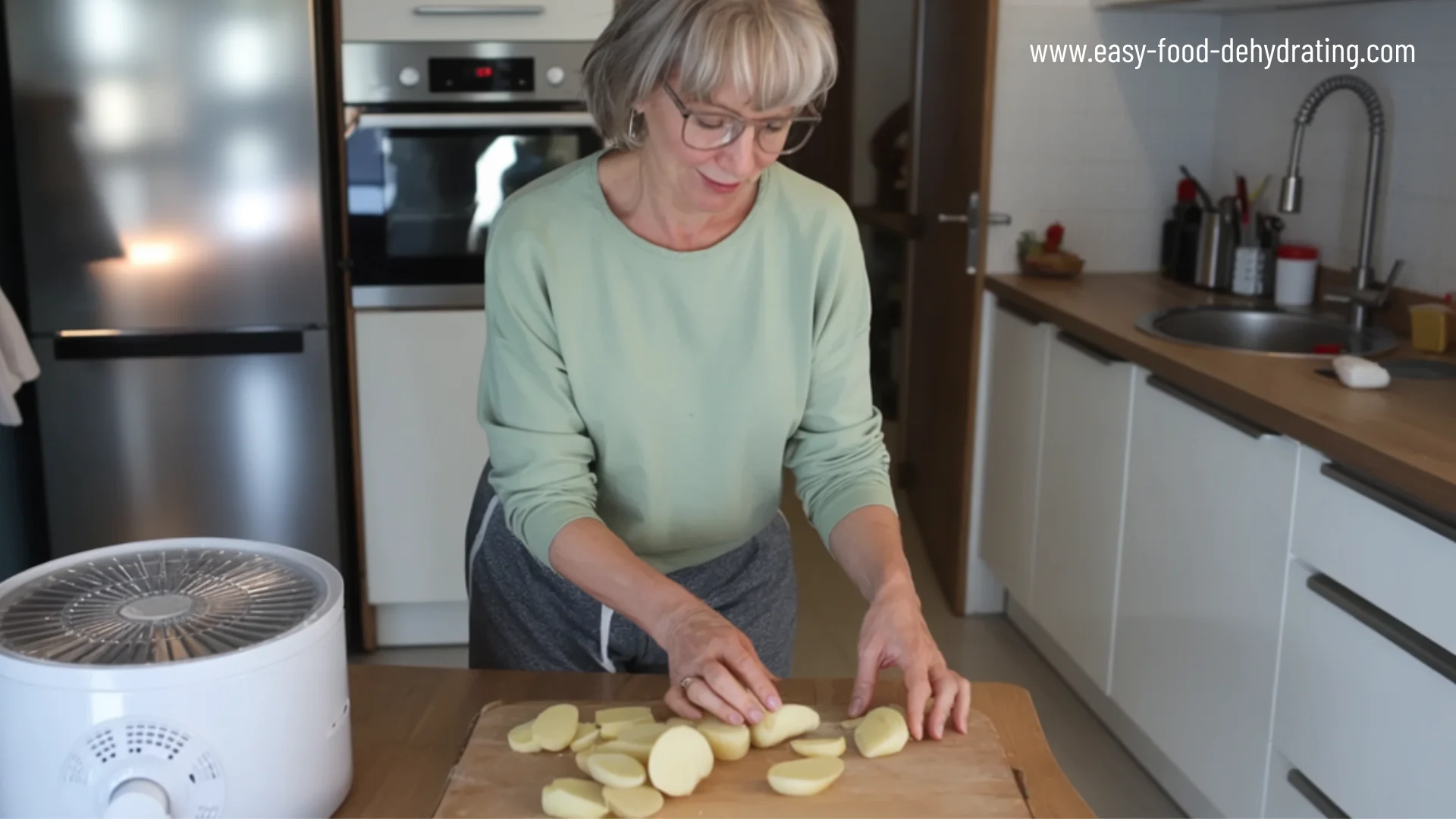
Take a quick peek at this potato selector guide from Sue Sanderson that takes you from choosing a cropping type to variety, planting tubers, and how to harvest and enjoy your spuds!
Potato Nutrition: Vitamins, Minerals & More
VITAMINS: Vitamin A, Vitamin C, and Choline, followed by Niacin, Thiamine, Vitamin B6, Pantothenic Acid, and Betaine. There are trace amounts of Vitamin K and Folate.
MINERALS: Potassium, followed by Phosphorus, Magnesium, and Calcium. There are also trace amounts of Iron, Zinc, Manganese, Copper, and Selenium.
Potatoes contain Omega-3 and Omega-6 fatty acids too.
The Secret to Firm Potato Slices (No Mushy Cuts!)
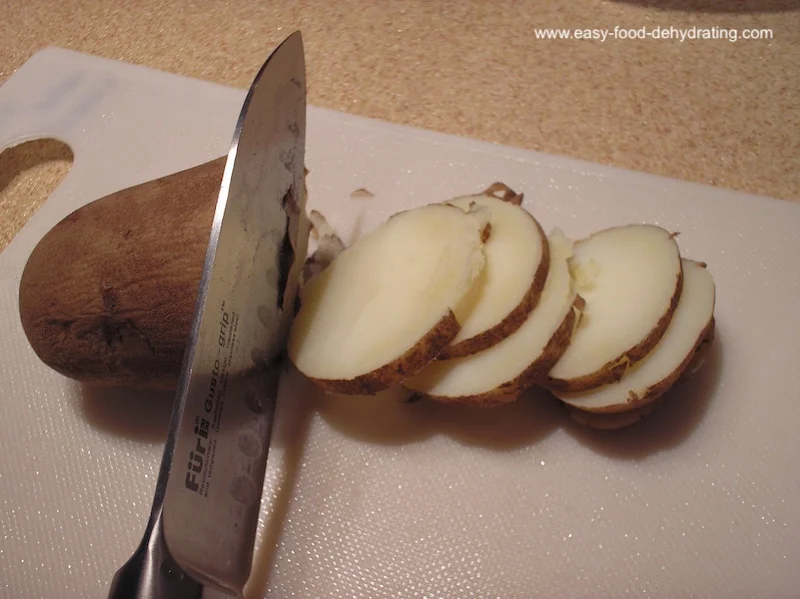
If you want a great way to slice potatoes - cool them off! Put them (whole) in the refrigerator
overnight.
Then, when slicing them, they'll be much firmer - and you won't have to deal with hard-to-cut warm mushy potatoes! Works wonders!
Begin by Using a Good Sharp Knife by Cutluxe!
Check out this great chef's knife with a full tang that means the handle and blade "are one" so they can't come apart when we're slicin' and a dicin'.
I know these Cutluxe Chef knives may be a little expensive, but they do last pretty much a lifetime when you maintain their cutting edges.
As an Amazon Associate, I earn from qualifying purchases — this does not affect the price you pay. Read full disclosure.
Step-by-Step Guide: Dehydrating Fresh & Frozen Potatoes
If using frozen hash brown potatoes, ignore steps 1, 2, and 3.
- Gently scrub and wash potatoes in the sink.
- Put them in a pan of water, NO SALT, and bring to a boil, simmer for 20 minutes.
- Place potatoes in a bowl, and when cooled off, put them in the refrigerator overnight. This helps tremendously when you slice them tomorrow into 3/8" slices! I leave the skins on, as there are loads of nutrients in the skins too.
- Arrange the potatoes on your food dehydrator trays, making sure the potatoes don't overlap.
- Turn on your food dehydrator and set the temperature between 125°F and 135°F (or per your food dehydrator's instructions).
💡 Tip: Outside the U.S.? Most dehydrating temps here are listed in Fahrenheit - use our quick converter to see the Celsius equivalent for your machine.
- Potatoes will be leathery and/or brittle when fully dried.
- Drying time for potatoes: between 6-14 hours.
- Please remember to rotate your trays for even drying.
Frozen Hash Browns Clumping? Here’s the Easy Fix
When using frozen hash brown potatoes and clumps
persist, run the clump under cool running water for a few seconds—that should do the trick! Pat dry the potatoes with paper towel if necessary after de-clumping.
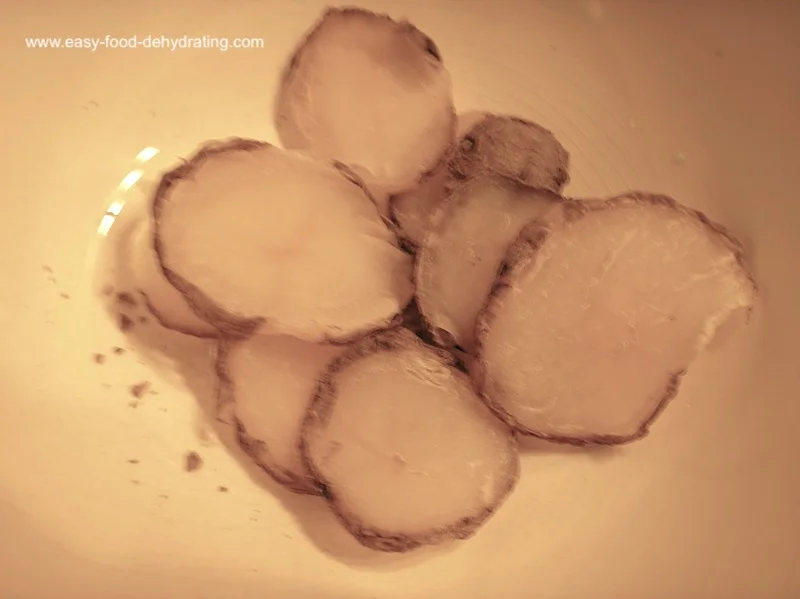 Dehydrated sliced potatoes
Dehydrated sliced potatoes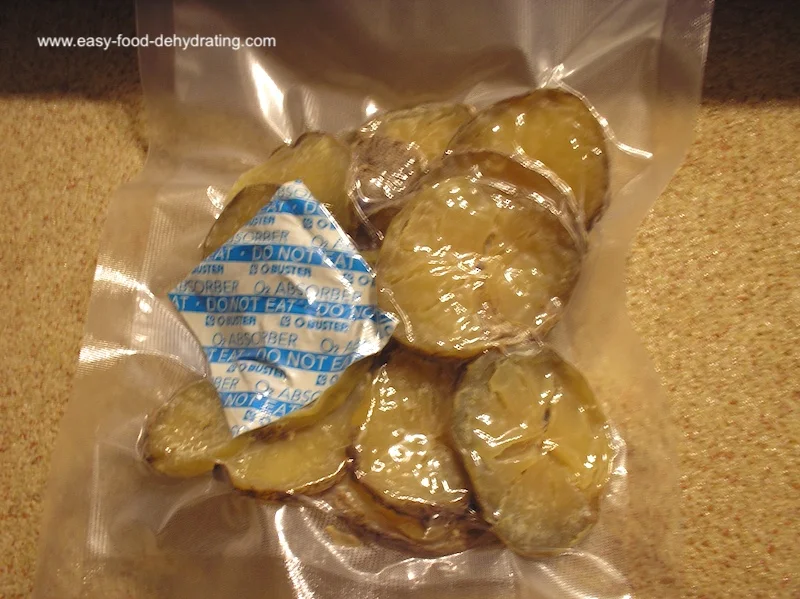 Dehydrated sliced potatoes, vacuum sealed with an oxygen absorber
Dehydrated sliced potatoes, vacuum sealed with an oxygen absorberJoan's Dehydrated Potato Journey
Joan, fondly known as the "Case Hardened Lady" wrote in to tell us how she gets ready for dehydrating potatoes. Here it is, straight from Joan:
"Started batch number four of potatoes this morning. Things are running quickly and smoothly now that I have the routine down. Still forgot to start heating the blanching water first, though. It takes about 20 minutes on my stove. I'm making sliced raw potatoes.
Anyway, in my mind it takes longer to peel and slice potatoes than to get the water boiling. In reality, it's only a few minutes of prep, and then the potatoes are ready and the water isn't.
Oh, what a journey these 99-cent bags of potatoes have taken me on!"
~ ~ ~
Joan, thanks for writing in! :-)
Reader’s Favorite: Potato & Bacon Hash Recipe
This recipe hails from John in the UK. Try it. It's awesome! Make this Potato and Bacon Hash recipe.
Must-Know FAQs About Dehydrating Potatoes
Can you dehydrate sweet potatoes?
Can you dehydrate sweet potatoes?
Yes! Peel, slice ¼" thick, blanch for 3 minutes, and dehydrate at 135°F for 8–14 hours until leathery. Store airtight for up to 1 year.
Can you dehydrate mashed potatoes for later use?
Can you dehydrate mashed potatoes for later use?
Yes, but it’s better to make potato flakes from cooked mashed potatoes. Spread a thin layer on trays, dehydrate at 125°F for 6–10 hours, then crumble into flakes, or grind to powder. Store airtight with an oxygen absorber and a desiccant packet.
How long does it take to dehydrate potato slices?
How long does it take to dehydrate potato slices?
Typically 6–14 hours at 125–135°F depending on thickness, humidity, and your dehydrator model.
Do you need to blanch potatoes before dehydrating?
Do you need to blanch potatoes before dehydrating?
Yes, blanching helps preserve color, texture, and nutrients, and prevents spoilage during storage.
How do you store dehydrated potatoes long term?
How do you store dehydrated potatoes long term?
Cool completely, then vacuum seal in Mason jars or food vacuum-sealer bags with oxygen absorbers along with desiccant packets. Store in a cool, dark place.
Can you use dehydrated potatoes in soups and stews?
Can you use dehydrated potatoes in soups and stews?
Absolutely! Add directly to hot soups or stews. They’ll rehydrate as they cook, absorbing flavors beautifully.
I hope this guide makes dehydrating potatoes simple and fun for you! Whether you’re stocking up for soups, casseroles, or camping meals, dehydrated spuds are a real pantry saver.
Before you go, don’t miss your free 5 Dried Food Recipes You’ll Actually Love PDF (below) — featuring my all-time favorites: carrot soup, minestrone, split pea soup, spicy beef jerky, and banana cinnamon rolls.
Get 5 Dried Food Recipes You'll Actually Love
Here's where you can get your copy of our all new
5 Dried Food Recipes (That Actually Taste Great)
They're my all-time favorite easy dried food meals!
Get it here right now.
For Free!
Before You Go...
If you enjoyed this page, tap the ❤️ in the lower right-hand corner.
It saves this page to your Grow bookmarks so you can find it again later.
You’ll also see quick share buttons to copy the link, post to Facebook,
or save it straight to Pinterest.


